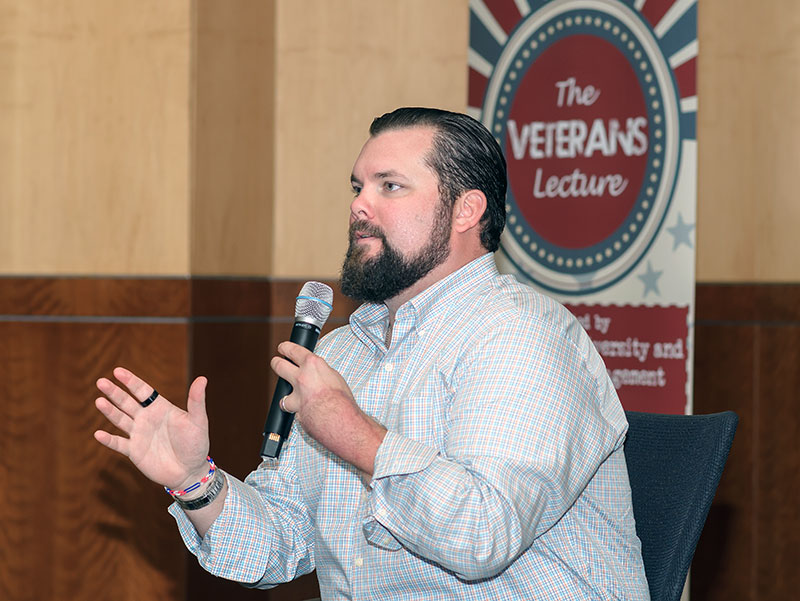
Retired Marine Cpl. Jacob Schick spoke about his military experiences at the Veterans Day Lecture on campus. Schick found help with the Warrior Training program at the Center for BrainHealth and gives back as a warrior relations specialist with its Brain Performance Institute.
An Iraq war veteran who credits UT Dallas for helping to retrain his brain encouraged the campus community to become advocates for veterans who struggle to reintegrate into society.
Retired Marine Cpl. Jacob Schick recounted his military experience and injuries for student veterans, faculty and staff at the Veterans Day Lecture, presented by the University’s Office of Diversity and Community Engagement and the Veteran Services Center. He works to raise awareness for veterans who survived combat but are dying by suicide at the rate of 20 a day.
In 2004, Schick was severely wounded in Iraq when a triple-stacked tank mine detonated beneath his Humvee. He lost his right leg below the knee and part of his left leg and hand.
Schick said his military career started as a desire to follow in the footsteps of his grandfather and uncle, who both left the Marine Corps as corporals. He signed up to enlist at the beginning of his senior year of high school in 2000 and went to boot camp with a “tight-knit group of alpha males” a month after the 9/11 attacks.
“It’s helpful to hear and to understand what it means to be a vet and give service to your country. He has a real story to tell, having been in the war, it’s real. It’s encouraging to hear his challenges, and that he’s been able to surmount them.”
Dr. George Fair, vice president
for diversity and community engagement, and professor and dean of the School of Interdisciplinary Studies
“I knew then I was going to war. It was a sobering feeling for a 19-year-old. I was very aware this could go badly for me,” Schick said.
After boot camp, he went to the School of Infantry (West) Camp Pendleton, California, where he was trained as a rifleman. He soon became a squad leader.
Schick later reported to 1st battalion, 23rd Marines, and deployed to Iraq in 2004. He was assigned to the Sunni Triangle. While there, Schick’s vehicle was destroyed by an improvised explosive device. As a squad leader, he was responsible for nine men. Though he was severely injured, Schick said his main concern was for his squad members.
“I asked God, ‘Just don’t take me in front of my brothers,’” Schick recalled praying.
Schick’s recovery included 46 operations, 23 blood transfusions and rehabilitation. He was also diagnosed with post-traumatic stress disorder and traumatic brain injury.
The hardest part of his recovery was getting off of medication.
“I reintegrated (into society) with a bag of drugs. I was numb. I woke up and focused on not eating a bullet every day. I didn’t want to be a burden,” Schick said. “I don’t know what is worse: being blown up or getting off drugs. I know why addicts stay addicts.”
Finally, his wife spoke a hard truth to him: “You owe it to your brothers who didn’t come home to live, and live well.”
Schick found help through the Warrior Training program at the UT Dallas Center for BrainHealth and gives back as a warrior relations specialist with its Brain Performance Institute.
Today, he is involved with the organizations Carry The Load and 22Kill. He has made numerous television appearances, was featured in the HBO documentary “Alive Day Memories: Home from Iraq” and had a role in the movie “American Sniper.”
Veteran Cord Ceremony
On Monday, Dec. 12, the University will honor graduating student veterans, their military service and their academic achievements at a special ceremony in the McDermott Suite (MC 4.404).
Retired Marine Cpl. Jose Leguna, an emerging media and communication sophomore, said he felt inspired by Schick’s lecture. Waiting in line to talk with Schick after the lecture, Leguna was accompanied by his service dog, Mattis, who helps him “maintain calm.” Leguna works as a stress management coach and speaker.
“This was great. I served in the same place,” Leguna said. “When I came to campus, I was very judgmental and angry at the obliviousness of many students. I felt resentment in a way.”
Schick encouraged UT Dallas faculty and staff who want to help student veterans on campus to be willing and prepared to take phone calls in the wee hours of the night.
“It’s worth it. You can’t put a price on life,” he said.
Dr. George Fair, vice president for diversity and community engagement, and professor and dean of the School of Interdisciplinary Studies, said it’s helpful for students to see a veteran up close. Fair is a Vietnam War veteran.
“It’s helpful to hear and to understand what it means to be a vet and give service to your country. He has a real story to tell, having been in the war, it’s real. It’s encouraging to hear his challenges, and that he’s been able to surmount them.”